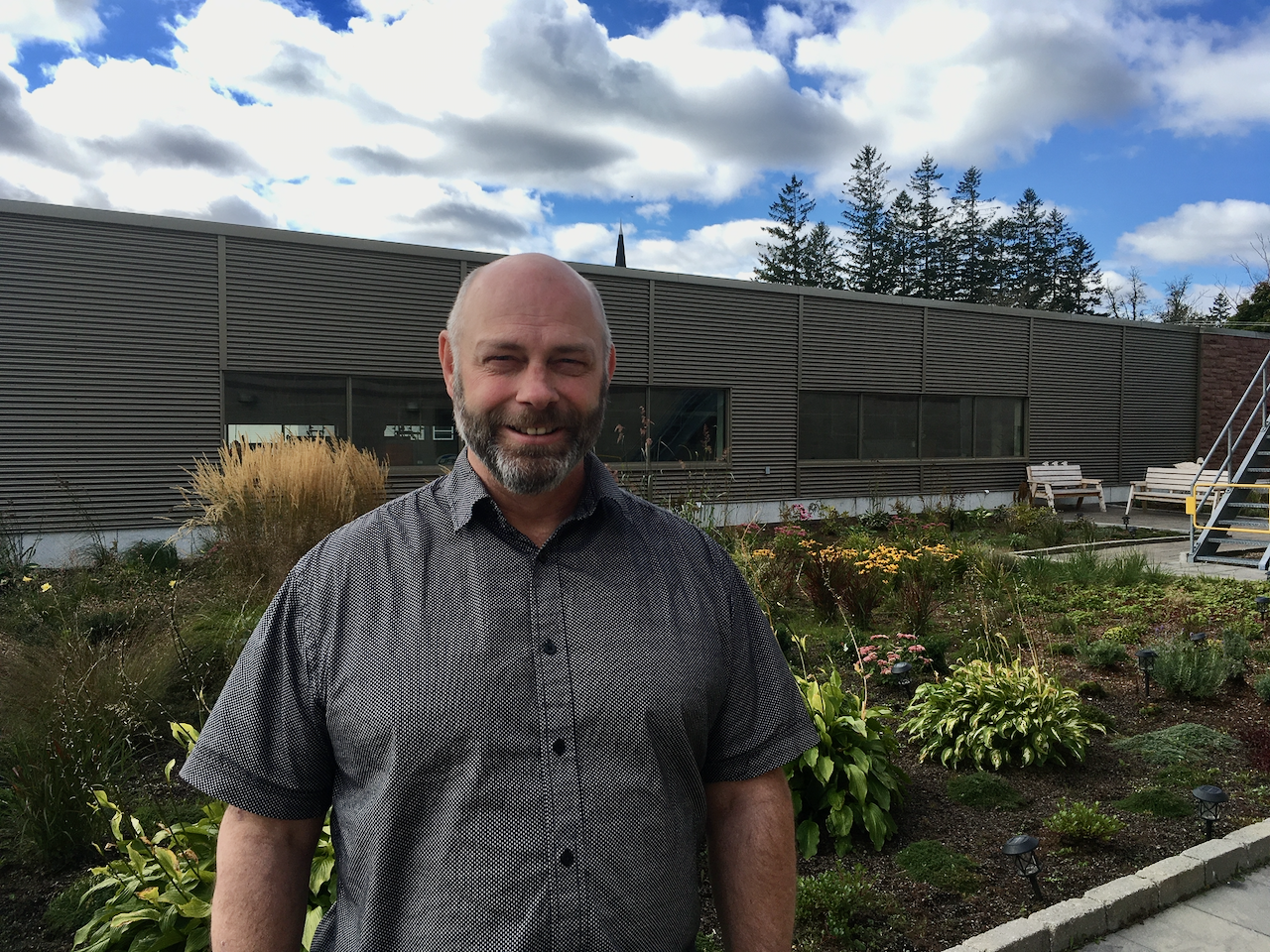
Jon Eppell might just be the only person working for the town of Sackville who knew full well when he was hired that the town would be undergoing radical changes in the coming months, including a new name, new boundaries, new communities, and a new government. And he wanted the job anyway.
As Sackville’s new Town Engineer, Eppell leads the public works department and oversees all roads, facilities and the town’s sewer and water services.
In mid-September, CHMA dropped by town hall to meet Eppell and find out a bit more about the new public works boss:
Eppell comes to the town of Sackville after working the past three years with Cumberland County, Nova Scotia, but he’s been a Sackville resident since 2009, when his wife took a job in town and his family made the move. For years he commuted to Nova Scotia for work, first as engineer for Halifax Harbour Bridges and then as operations manager for Cumberland County.
When the post for Town Engineer went up earlier this year (after former Town Engineer Dwayne Acton moved on to a position with Mount Allison,) Eppell says he was “quite excited at the opportunity.” One of the reasons Eppell made the move from Halifax Harbour Bridges to Cumberland County was to be closer to family in Sackville, and so the new job was a natural fit.
“I really enjoyed working on suspension bridges, but as time went on, I got tired of the travel,” says Eppell. “And so coming to the town of Sackville, where I live, made a lot of sense this year.”
The work in Sackville, as in Cumberland County, is much more generalized than Eppell’s previous work at Halifax Harbour Bridges. Working first as a consultant for the bridge commission, and later as their full time engineer, Eppell was integral in the third lane project, which added a vehicle lane and two active transportation pathways to the city’s MacDonald Bridge. Then later he worked on the Big Lift, which replaced the entire span of the bridge in pieces, all while the bridge remained open to traffic during most daytime hours.
“We would go in on a weekend, and we would remove a 20 meter long segment, 66 feet long, and replace it with a brand new one. And then reopen to traffic through the week, which is highly unusual,” says Eppell. “It’s only the second time it’s ever been done in the world.”
Eppell’s Sackville job is less specialized but not without its challenges. “It’s a lot of road and municipal water and sewer type projects, replacing trucks and vehicles and looking after snowplowing and public works,” says Eppell. “A lot of it is returning to what I was doing early on in my career and as a consultant because I did a lot of highway design, road design, services, design, subdivisions, parking lots, that kind of stuff.”
“Sackville has got a lot going for it because of where it’s located,” says Eppell, “but it also has challenges with flood risk from climate change. We all are aware of that and there’s been some projects that have been done there.”
There’s also a municipal infrastructure deficit common to cities and towns across Canada and the US, says Eppell. “From what I can see the town of Sackville is actually in quite a good position, and has dealt with things very well up to this point,” he says. “I’m hoping to continue and build on that as we move forward.”
Eppell says he doesn’t expect any major changes to the Public Works department in the near future. “I think it’s getting to know the systems and how things are performing and looking for opportunities,” says Eppell. “As time goes on, I’m sure we’ll evolve a little bit, but I don’t see any wholesale changes now.”
As for the amalgamation, Eppell is positive in his outlook, despite having witnessed a much larger amalgamation (of Halifax, Dartmouth, Bedford and the county of Halifax) as a Nova Scotia resident. “It took them 10 years to kind of get their feet back fully,” says Eppell, “and know how to function with one another. I don’t see this one as being as complicated, because it’s smaller communities, fewer people, and there’s been a close relationship anyway. I think it’s going to go surprisingly well, is my expectation.”
“The reality is, reasonable things are going to be done to ensure that services are continued to be delivered for all of the communities that are in the amalgamation,” says Eppell.
Eppell says he expects that not all public works projects will meet with universal approval, but he is open to hearing from local residents about their concerns.
“There’s no magic to this job,” says Eppell. “It’s trying to take engineering principles and knowledge and experience that we’ve had from past practices, and apply them to the future, and try to do the best we can.”
“I’m sure there’s going to be lots of people that will disagree with certain aspects of what’s done,” says Eppell. “There’s always people that do. And we’ll listen, but at the end of the day, we have to try and make the best decision for the majority.”
